X-Frame for waste free buildings gets commercialisation boost
Wellington, 15 November 2019
Clip-together modular building design can be rapidly assembled, disassemled and reused, eliminating waste during a building’s lifecycle.
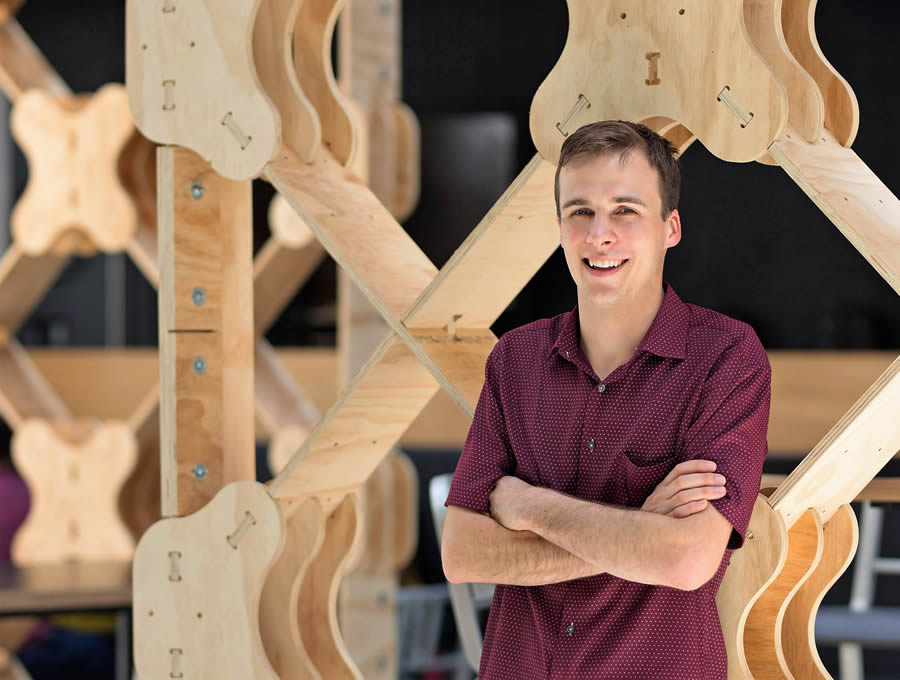
Victoria University of Wellington PhD candidate Ged Finch
Victoria University of Wellington PhD candidate Ged Finch is fast tracking the commercialisation of his X-Frame structural frame solution for waste free buildings with support from the KiwiNet Emerging Innovator Programme.
Finch's game-changing building design, a self-braced interlocking wood design which clips together eliminating the need for single-use fixings, has the potential to eliminate waste and reduce the amount of raw materials being used by the building industry. Approximately half of all New Zealand's waste—about 1.6 million tonnes every year—is generated by the construction sector.
"The current widespread use of adhesive-based fixings and single-life materials means that building a single new home will create about four tonnes of waste during construction, and even more when it's eventually demolished and taken to the landfill," says Finch.
Finch, who has been working with Viclink to commercialise his framing system that can be disassembled and re-used at the end of a building's useful life, also secured a place on KiwiNet's Emerging Innovator programme to help commercialise the green architectural solution.
Every single component of Finch's X-Frame design, cut by a computer-controlled router, can be disassembled and reused, so no waste is produced at any stage of a building's lifecycle. The clip-together design allows any type of structure—floors, walls, ceilings—to be rapidly assembled and disassembled many times over, using unskilled labour and a bare minimum of tools, akin to flat-pack furniture. Adding doors or windows at a later stage is simple, and when kids leave home: "they could literally take their rooms with them, as our modular design also clips onto standard framing."
Dr James Hutchinson, CEO of KiwiNet, says: "Ged's vision is to transition the building sector from a linear (take, make, dispose) economy to a circular economy—where materials are reused in endless cycles. His approach could set a new benchmark for sustainable design, and it makes great commercial sense. KiwiNet's Investment Committee saw an opportunity to support Ged with expertise, networks and funding to do specialised work required to demonstrate his ideas at scale, and to assist with the commercialisation pathway from concept to new architectural solution."
Finch came up with his idea during his Masters year and, under the guidance of Guy Marriage—Senior Lecturer in the School of Architecture—has taken it into his PhD (with additional supervision from Dr Antony Pelosi and Dr Morten Gjerde).
Viclink has been an amazing support," says Finch. "During my Masters, Liam Sutton—one of Viclink's Commercialisation Managers—brought in an IP specialist to talk to me about how to protect my intellectual property and also connected me to a circular economy start-up funder."
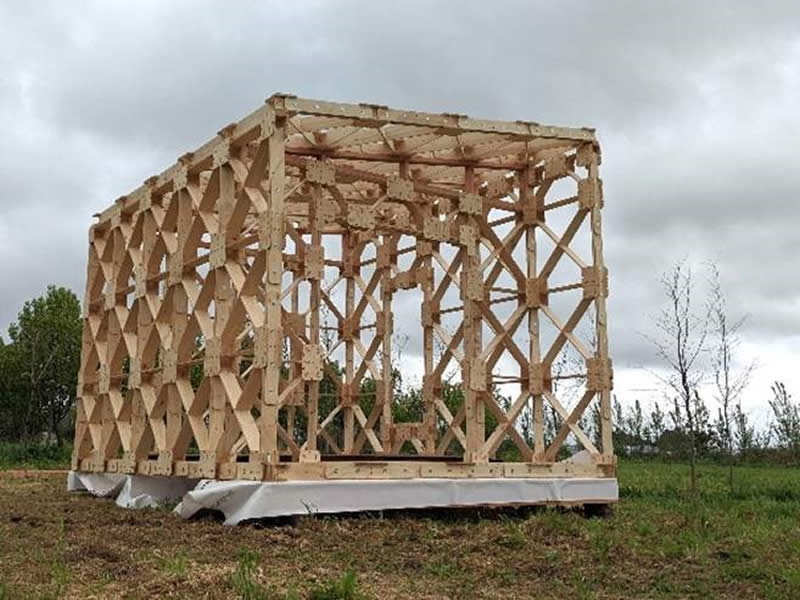
X-Frame Prototype Pod 1 Structural Frame
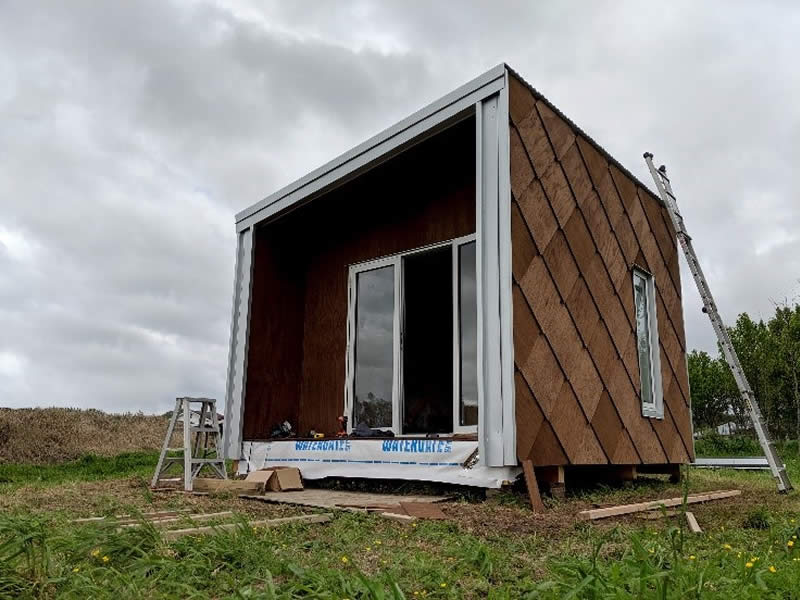
X-Frame Prototype Pod 1 with reusable shingle cladding and roof slope
Finch says Viclink introducing him to KiwiNet has had one of the biggest impacts to date as it has given him access to a great network of expertise and experience, his own business mentor and funding to further develop his product.
"I'm using the funding to carry out specialised work required to finalise engineering designs for the earthquake resistant hold down fixings for the walls and interior," says Finch. "KiwiNet's support is also helping me to test the structural integrity and weather-tightness of the X-frame product, both critical features for any future commercialised product. They've also arranged for me to meet with scientists from Scion who are developing natural adhesives from forest waste products and Auckland based company Fastmount which manufactures reusable clips that connect interior wall linings with the structure. These materials perfectly complement the X-Frame technology—the networking is the magic!"
He says that even though X-Frame is innately earthquake stable because of its design geometry, independent structural testing is crucial in getting his product to market. His PhD scholarship funded by the Building Research Levy (BRANZ) is also assisting with the project, with additional funding also provided for structural testing of the prototype product.
Finch is currently building a small (10m2) prefabricated prototype dwelling in Auckland to demonstrate his ideas at scale and to inform market viability. He believes the completed prototype will be New Zealand's most sophisticated 'circular' building.
Finch says, "This prototype build is a major step as it is the first time we will have built the entire wall system with cladding, cavity battens, insulation and an internal lining. Unitec Institute of Technology's School of Architecture have helped out by providing robotic fabrication facilities to create the frame – which means we'll be able to have the entire building water-tight in less than one week on-site. We're cladding the assembled X-Frame in an entirely reusable, chemical free external cladding system centered around a naturally preserved timber product being developed by Abodo Wood Ltd."
Finch was recently invited to present his concept at the Advanced Building Skins (ABS) conference in Bern, Switzerland. He says this was recognition from the international building industry that major changes are needed to curb waste production.
Finch says X-Frame could totally transform the way we think about buildings. "My 'blue-sky' objective is to build a housing development with a complete circular economy design—where all building materials can be quickly recovered at the end of a structure's life and either efficiently recycled or directly reused without any negative environmental impacts."
The KiwiNet Emerging Innovator Programme is open to early career researchers based at universities, public research organisations and other publicly funded research organisations across New Zealand. Programme recipients receive expert legal advice from KiwiNet corporate partner MinterEllisonRuddWatts and IP advice from Baldwins, as well as funding from the Norman Barry Foundation, owner of the Quality Hotel Parnell Limited, K1W1 and PreSeed Accelerator Funding, from MBIE.
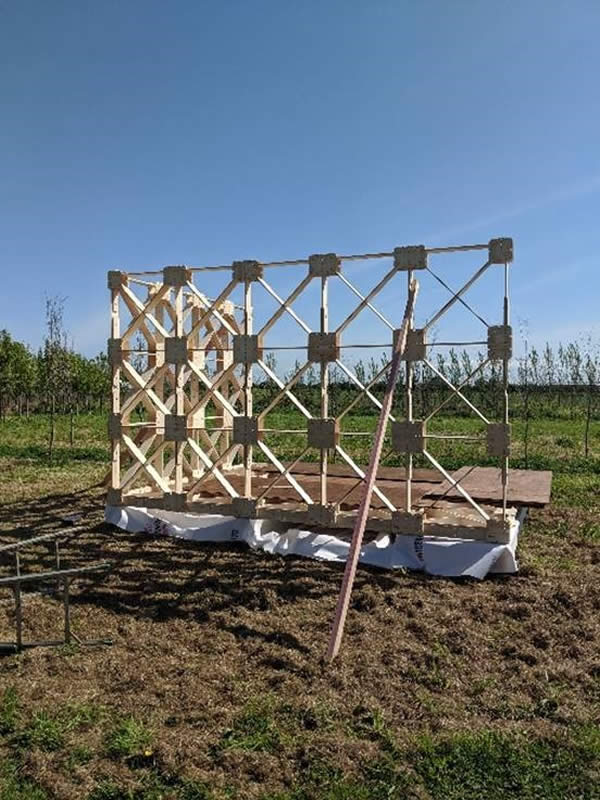
X-Frame Prototype Pod 1 first two walls standing
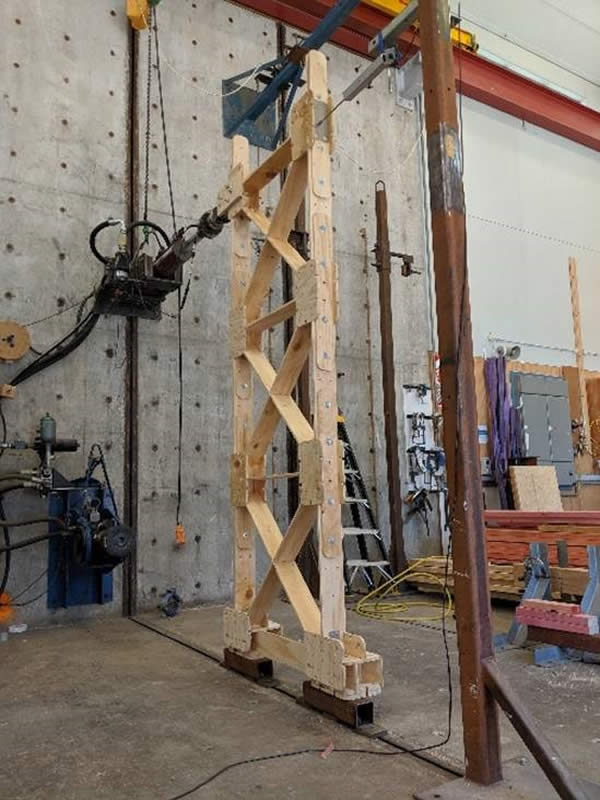
X-Frame earthquake load structural testing at Building Research NZ
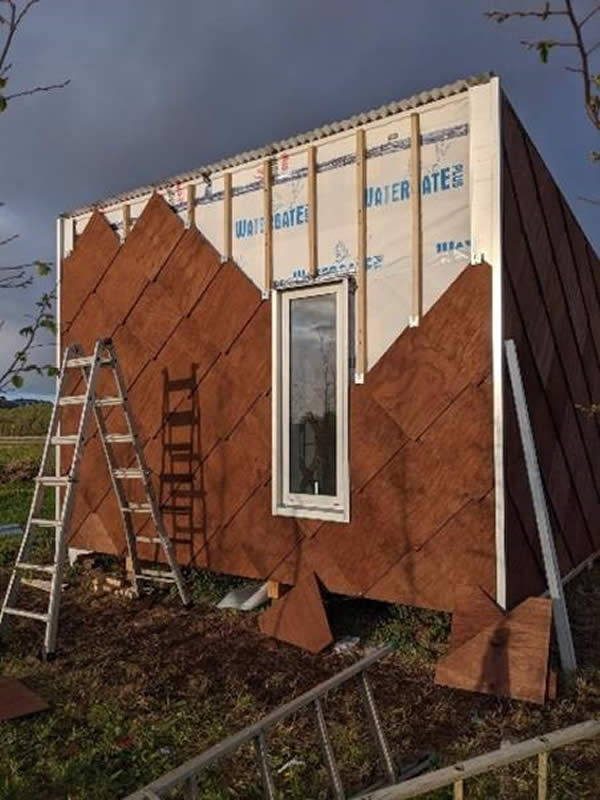
X-Frame Prototype Pod 1 with reusable shingle cladding and roof slope
Radio NZ interview with Ged Finch
Designing waste-free buildings - from Afternoons with Jesse Mulligan, 2:20pm on 25 November 2019
For further information please contact:
Sandra Lukey
Shine Group (PR for KiwiNet)
Cell: +64 21 2262 858
Email: sandra@shinegroup.co.nz
About KiwiNet Emerging Innovator Programme
The KiwiNet Emerging Innovator Programme was established in 2015 by KiwiNet with the generous philanthropic support of the Norman Barry Foundation. The aim of the Emerging Innovator Programme is to have more scientists with disruptive new ideas working alongside businesses to solve industry challenges. It is open to scientists from public research organisation who demonstrate a clever new idea and a willingness to work closely with industry as they develop a prototype. The KiwiNet Emerging Innovator Programme is available to early career researchers based at universities and public research organisations across New Zealand.
About the Norman Barry Foundation
The Norman Barry Foundation, is a charitable trust registered under the Charities Act 2005. Norman Barry was an entrepreneur and a philanthropist who established the Quality Hotel Parnell. During his successful business career he mentored motel owners in Auckland who were new to the industry and helped various charitable organisations in the form of donations. Norman left his shareholding in Quality Hotel Parnell Limited to the Foundation, and the distributions from this Company to the Foundation are used for charitable donations. In addition, Quality Hotel Parnell Limited is also a registered charity in its own right and this company also makes donations to the community. To date the Foundation has contributed $475,000 to the KiwiNet Emerging Innovator Programme.
